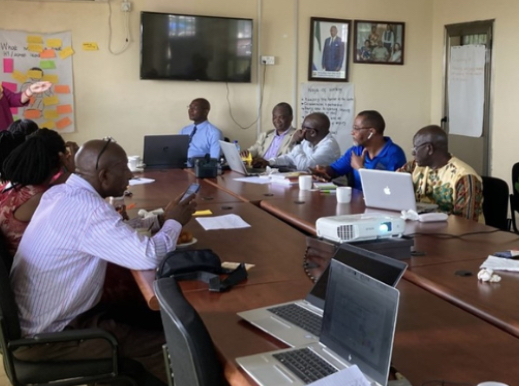The Education Development Trust (EDT) and the Education Commission co-hosted a knowledge exchange event last month, bringing together key stakeholders and policymakers from Sierra Leone’s education sector. School leadership experts from our programmes in Ethiopia, Kenya, Rwanda and Zimbabwe all took part, sharing practical insights and lessons learnt from their experiences. They shared how they have worked with policymakers to lead and implement system-wide school leadership reforms to improve teaching and learning quality. The event is an example of our commitment to creating a pan-African alliance, enabling school leaders across the continent to share research and best practice to improve learning outcomes for all.
The Sierra Leone Teaching Service Commission recognizes that school leadership has a big impact on learning outcomes, yet school leaders in Sierra Leone currently receive inadequate training. EDT is working as part of a consortium led by the Education Commission with support from the World Bank and partners to co-design with the Ministry of Education and the Teaching Service Commission in Sierra Leone a new national school leadership professional development programme to reflect the Sierra Leone context and deliver improved learning outcomes for students.
The knowledge sharing event last month provided a valuable opportunity to hear from experts and practitioners across Africa who are on a similar journey to improve school leadership. Participants shared how they have experimented with a range of evidence-informed and innovative solutions to tackle issues such as increasing women in leadership and opportunities such as professional accreditation.
EDT’s Building Learning Foundations’ (BLF) Leadership for Learning Lead, Dr Jean Pierre Mugiraneza, explained how 98% of school leaders in Rwanda achieved the essential competencies from a baseline of 41% within the last three years. Meanwhile, EDT’s Leadership Training Reform Lead in Ethiopia, Tigist Tefera, also showcased how 82% of school leaders in Ethiopia met or exceeded the optimum competencies to lead learning within one academic year, despite COVID-19 and regional conflicts.
Presentations focused on key thematic areas within leadership for learning. Dr Mugiraneza explained how accreditation has helped to address system-level change in Rwanda to create a structure for school leaders’ professional progression. He also presented strategies for increasing the number of women in school leadership positions through creating middle-tier pathways to school leadership – a topic which prompted much discussion on the shared challenges faced in Sierra Leone.
Deputy Project Director of EDT’s Girls’ Education Challenge Transitions (GEC) programme in Kenya, Margaret Kamau, shared the best practice of ‘professional learning communities’. These communities are empowering leaders, enabling them to share best practice and building resilience. This struck a particular chord with one of the participating consultants from Sierra Leone, Dr Aminata Sessay:
“I think the community of practice aspect will work extremely well. […] we can create great leaders among the few that we have and they can be coaches and mentors for others, so we are able to achieve sustainability. Usually when you have school clusters, they have similar contexts and as a result their problems will be similar. And if they are going to work together, they can share the load by sharing responsibility.”
Dr Aminata Sessay
Further presentations from EDT’s programmes, TARGET Ethiopia and TEACH Zimbabwe, fed into follow-up discussions on how to implement a competency-led approach, ensure effective co-design and collaboration with ministries, and align with approaches to teacher professional development to strengthen the whole school and ensure sustainability.
At the close of event, Chair of the Teaching Service Commission, Mr. Conrad Sackey acknowledged the importance of collaboration and partnership as a tool for supporting school leadership, saying:
“There is a need to link school leadership to learning outcomes in Sierra Leone and that will require a collaborative effort between organs operating under the Ministry of Education and the private sector.”
Insights and learning from the event will be taken forward into the ongoing co-design process.
This blog was originally published by the Education Development Trust here.

